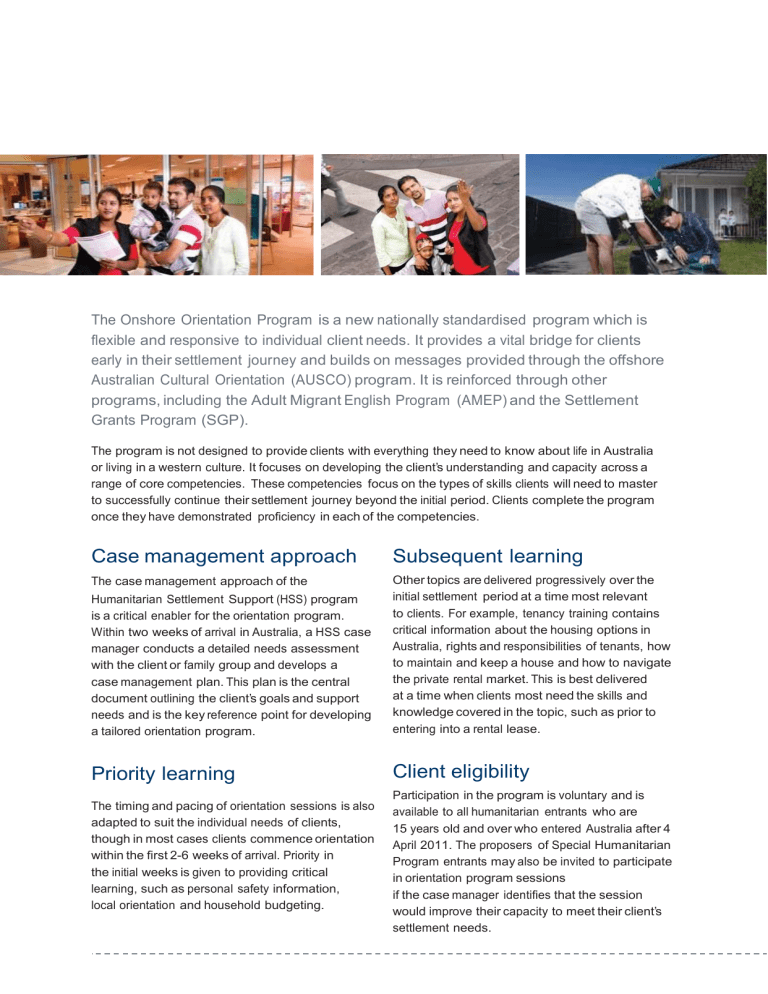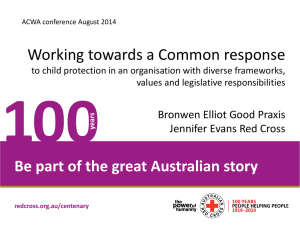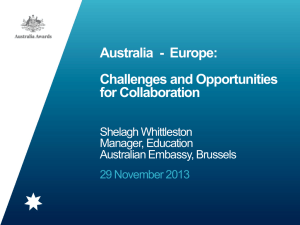Onshore Orientation Program Brochure

The Onshore
Orientation Program
The Onshore Orientation Program is a new nationally standardised program which is flexible and responsive to individual client needs. It provides a vital bridge for clients early in their settlement journey and builds on messages provided through the offshore
Australian Cultural Orientation (AUSCO) program. It is reinforced through other programs, including the Adult Migrant English Program (AMEP) and the Settlement
Grants Program (SGP).
The program is not designed to provide clients with everything they need to know about life in Australia or living in a western culture. It focuses on developing the client ’s understanding and capacity across a range of core competencies. These competencies focus on the types of skills clients will need to master to successfully continue their settlement journey beyond the initial period. Clients complete the program once they have demonstrated pr oficiency in each of the competencies.
Case management approach
The case management approach of the
Humanitarian Settlement Support (HSS) program is a critical enabler for the orientation program.
Within two weeks of arrival in Australia, a HSS case manager conducts a detailed needs assessment with the client or family group and develops a case management plan. This plan is the central document outlining the client ’s goals and support needs and is the key reference point for developing a tailored orientation program.
Priority learning
The timing and pacing of orientation sessions is also adapted to suit the individual needs of clients, though in most cases clients commence orientation within the first 2-6 weeks of arrival. Priority in the initial weeks is given to providing critical learning, such as personal safety information, local orientation and household budgeting.
Subsequent learning
Other topics are delivered progressively over the initial settlement period at a time most relevant to clients. For example, tenancy training contains critical information about the housing options in
Australia, rights and responsibilities of tenants, how to maintain and keep a house and how to navigate the private rental market. This is best delivered at a time when clients most need the skills and knowledge covered in the topic, such as prior to entering into a rental lease.
Client eligibility
Participation in the program is voluntary and is available to all humanitarian entrants who are
15 years old and over who entered Australia after 4
April 2011. The proposers of Special Humanitarian
Program entrants may also be invited to participate in orientation program sessions if the case manager identifies that the session would improve their capacity to meet their client ’s settlement needs.
National Orientation
Framework
The National Orientation Framework provides an overarching structure to support the delivery of the orientation program. It outlines:
UÊ the principles that govern its design and delivery
UÊ the core competencies that clients need to successfully continue their settlement journey beyond the initial settlement phase
UÊ the scope of topics that may assist clients to develop the necessary skills and confidence to become active participants in the social and economic life of Australia.
The scope of topics include:
UÊ Introduction to Australia
UÊ Local Orientation and settling in
UÊ Money Management
UÊ Renting
UÊ Youth Issues
UÊ Family life
UÊ Education
UÊ Health
UÊ Work
UÊ Cultural issues
UÊ Australian law
UÊ Ongoing settlement and social help
UÊ Humanitarian Program and Citizenship.
Core Competencies
Program outcomes
The National Orientation Framework core competencies outline both the outcomes that the program seeks to achieve and the skills and knowledge that clients require to enable them to successfully continue on their own settlement pathway for the future.
These competencies are also central to the success of the HSS program at the client level. They help determine whether clients have the foundations they need to progress beyond the initial settlement phase. Clients complete the program once they demonstrate necessary skills and knowledge to confidently address the following areas:
UÊ finding information and accessing services
UÊ making an appointment
UÊ transport
UÊ money management
UÊ tenancy issues
UÊ employment and education
UÊ Australian law.
Orientation Program Principles
Tailored to needs: The content and delivery style of orientation sessions should be tailored to individual client needs, learning capacities and existing areas of pr oficiency. This should include taking account of particular needs, such as family commitments, and the learning styles of clients who may have limited literacy and English language skills.
Youth-focused: Particular attention should be given to the needs and learning styles of young people.
Service providers responsible for delivering program sessions should be mindful of maintaining good relationships with a young client ’s parents, carers or guardians.
Outcomes-based: The program should focus on developing client skills, knowledge, understanding and capacity across the core competencies.
Accessible : The program should be accessible to clients. This will impact on a range of issues from the choice of languages and teaching styles used to deliver sessions, to providing child-friendly facilities, located near public transport routes.
Assessing competencies
Onshore Orientation Program facilitators develop appropriate methods to assess whether clients have achieved these competencies. These methods are carefully designed to ensure that assessment is not intimidating and allows the client the opportunity to demonstrate skills they have developed. Activities such as role plays, observations, simulated situations and client quizzes are commonly employed to cater to the different learning styles of clients.
Core Competencies
Finding information and accessing services
The client will:
UÊ understand what services are available to them
UÊ be able to access services and know how to obtain information or assistance to access services. For example, visiting a Migrant Resource Centre, using the
Internet or attending the local library
UÊ be able to request an interpreter and use the Translating and Interpreting Service.
Making an appointment
The client will:
UÊ be able to make an appointment, for example with Centrelink or a Doctor by using the telephone or in person (with or without the use of an interpreter)
UÊ understand the importance of being punctual for appointments.
Transport
The client will:
UÊ be able to independently travel around their local community and the wider vicinity using public transport
UÊ understand road safety and licensing requirements.
Money management
The client will:
UÊ understand the value of money
UÊ develop household budgeting skills
UÊ be able to access money, including using an automatic teller machine, and use it to shop and pay bills without assistance.
Tenancy issues
The client will:
UÊ understand tenancy obligations, including property maintenance
UÊ develop an understanding of what is involved in finding a rental property and the tenancy application process, with a view to applying for a lease with assistance from other support agencies, if necessary
UÊ understand the importance of changing address with essential agencies when moving house.
Employment and education
The client will:
UÊ develop an understanding of education opportunities in Australia and associated career guidance services
UÊ understand how the Australian primary and secondary education systems operate.
For example, attendance, start and finish times, holidays, school lunches, behaviour in school and homework
UÊ develop an understanding of employment services and working in Australia.
Australian law
The client will:
UÊ comprehend child protection and family violence laws and their impact on family relationships
UÊ understand the role of police
UÊ develop understanding of Australian culture and laws and display culturally appropriate behaviour, for example politeness and punctuality.
Australia strategy
’s broader orientation
Orientation to a new country is a life-long journey that begins before arrival in Australia and continues well beyond an initial settlement period. For many it includes the acquisition of Australian citizenship. In recognition of this, the government has enhanced the orientation support provided through Australia ’s settlement programs, with particular emphasis on building client skills, knowledge and self-reliance.
This emphasis is part of a broader government strategy to provide high quality settlement services, maximising the many economic and social benefits of migration.
In addition to the new Onshore Orientation
Program, enhanced orientation support through
Australia ’s settlement programs includes:
UÊ Strengthening the AUSCO program following an extensive evaluation in 2009. This includes a revamped student handbook for use overseas and in Australia; a greater focus on the orientation needs of young humanitarian entrants; new resources for use in classes, and strengthened linkages between all of the department ’s orientation programs.
UÊ A greater settlement focus for the new Adult
Migrant English Program. This includes a two week settlement course and 200 hours of employment focused training to assist clients to learn vocationalspecific English while gaining familiarity with Australian workplace culture and practices.
UÊ The Settlement Grants Program which provides funds for generalist services for orientation and participation in Australian society, and specialist services assisting eligible clients become self- reliant as soon as possible after arrival.
UÊ A citizenship test designed to deliver knowledge of Australia and the responsibilities and privileges of Australian citizenship.
This broader strategy ensures that the skills and knowledge of humanitarian clients is developed and reinforced through multiple channels and built progressively over time. The objective is to build the self-reliance of clients and ensure their full participation in the economic and social life of Australia. The strategy also recognises that orientation to Australia is a journey, with programs targeted towards supporting clients through the various stages.
Australian citizenship
The process of acquiring citizenship is designed to demonstrate the client ’s knowledge of Australia, including its democratic beliefs, rights and laws.
The act of becoming an Australian citizen also has deeper significance. It involves making an ongoing commitment to Australia and all it stands for. It is the beginning of a humanitarian entrant ’s formal membership of the Australian community.








